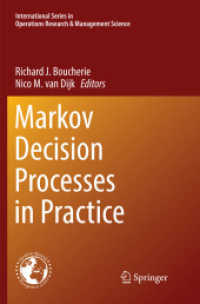- ホーム
- > 洋書
- > 英文書
- > Politics / International Relations
Full Description
Our societies obviously rest on common beliefs. These "myths" are tools that help us to develop and build common identities; they form the structure around which societies function. This does not imply that these beliefs are "true," in the sense that they would be supported by empirical facts. In social matters, myths have undoubtedly important functions to play even if no empirical facts support them. On the other hand, and precisely because they are not discussed, myths may be problematic: they may create illusions, conserve structures that are inefficient and unable to improve the situation of citizens.
This is particularly true with constitutions. Constitutions are very important for societies: a constitution is a document — even in societies based on "unwritten" constitutions — which binds citizens together, creating unity among them, and which forms the framework within which our activities take place. As Nobel Prize laureate James Buchanan used to say: constitutions contain the rules of the social game we play in our everyday life. However, constitutions are not frequently debated by citizens. This is why we end up with common beliefs about these constitutions: they are above our heads, around us. We take them, their role, function, and nature as given. The purpose of this volume to investigate and challenge common constitutional myths.
Featuring contributions from prominent economists, political scientists, and legal scholars, the chapters in this volume address such myths as "constitutions are binding social contracts," "constitutions are economic documents" and "constitutions are legal documents." Illustrating their analyses with historical and contemporary examples from the United States, Canada, and Europe, the authors build a multi-layered approach to understanding constitutions and their implications for social and political influence.
Contents
Binding Contract or Evolving Focal Point of Coordination: The Meaning of Constitutional Political Economy.- Consent, or Coercion? A Critical Analysis of the Constitutional Contract.- Identity, Constitutions and Constitutional Political Economy.- Power Relations in the Canadian Constitution: The Myths We are Expected to Believe.- Checks and Balances at the OK Corral: Restraining Leviathan.- Popular Sovereignty: A Case Study from the Antebellum Era.- The Constitution of a Direct Democracy.- Constitutional Political Economy.- The Myth of the Constitution as an Economic Document - Do Constitutions Enable Entire Societies to Make Them Better Off?- The European Court of Justice. a Guarantor or a Ianus Geminus?- A Comparison of Central Bank and Judicial Independence.- The Dual Rationale of Judicial Independence in Constitutional Discourse.








